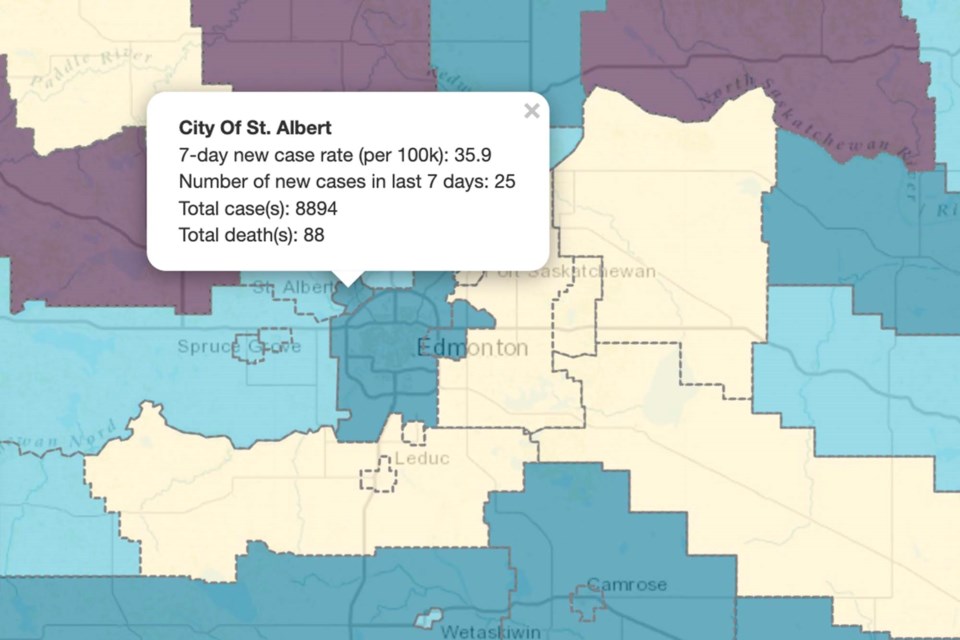COVID cases in St. Albert decreased slightly from July 19 to July 25, as Alberta-wide cases of the virus climbed, the province reported on July 27.
New COVID cases in St. Albert dropped slightly. The number of COVID cases in the city between July 19 to July 25 was 25, compared to the 26 cases reported last week.
Data from the province showed the seven-day case rate per 100,000 people was down to 35.9 compared to 37.4 reported the week prior.
There were no new COVID deaths in St. Albert. The total number of people who have died from COVID in St. Albert remained at 88.
There was an increase in COVID cases in Sturgeon County as reported by the province on July 27. There were seven new COVID cases in the county, compared to the five COVID cases reported last week.
Data from the province showed the seven-day case rate per 100,000 people in Sturgeon County was 25.1. Last week, the seven-day case rate per 100,000 people was 17.9.
There were no new deaths reported in Sturgeon County. The number of residents who have died from the virus remained at 18.
COVID numbers in Morinville remained the same as they were last week, the province reported.
Data from the province, current from July 27, showed eight new cases of COVID in Morinville.
The seven-day-case rate per 100,000 people in the town was 70.1, the province reported.
The number of people who have died from COVID in Morinville remained at 16.
The province is reporting an increase in per-cent positivity. The seven-day average for per-cent positivity rate for COVID was 23.3, as reported by the province on July 20. Last week, the province reported a 22.41 per cent positivity rate.
The number of Albertans hospitalized from COVID increased to 649. Last week, the province reported 559 Alberta-wide hospitalizations.
The number of people being treated in ICU increased by three. Between July 19 and July 25, the number of people in ICU was 26.
The province reported 13 more people had died from COVID between July 19 to July 25. The total number of Albertans who have died from the virus since the beginning of the pandemic was 4,665.
Federal health officials provide monkeypox update
Dr. Theresa Tam, Canada’s chief public health officer, said the Public Health Agency of Canada is working closely with international, provincial, and territorial partners on preventing and containing the spread of monkeypox in the country.
“While the global monkeypox outbreak is a serious concern, there is optimism that by focusing efforts in Canada and worldwide, we can seize this window of opportunity to contain the spread,” she said.
On July 27, Tam, along with Dr. Howard Njoo, deputy chief public health officer, gave a virtual update on the monkeypox situation in Canada.
Data current from July 26 showed there was a total of 745 monkeypox cases in Canada, with only 12 cases being reported in Alberta.
The last report on monkeypox in the province was given by Dr. Deena Hinshaw, chief medical officer of health for Alberta, on July 4, over social media.
At that time, Hinshaw said there were eight cases of monkeypox in the province, all in the Edmonton & Calgary zones.
“The overall risk in the province remains low,” Hinshaw said.
Most of the monkeypox cases current from July 27 in Canada are in Quebec (346) and Ontario (326). Data from the Government of Canada showed 58 cases in B.C., two in Saskatchewan, and one case in the Yukon.
“Among cases for whom additional information is available, over 99 per cent are male, and the median age was 36 years — in line with international trends,” Tam said.
Tam said that although the majority of cases in Canada reported sexual contact with other men, the virus can be spread to anyone through close contact with an infected person or contaminated items.
“Typically, the virus spreads through close contact with an infected person's bodily fluids, respiratory droplets, or skin sores, but it can also be spread by direct contact with personal or shared objects,” Tam said.
Common signs and symptoms include fever, headache, muscle aches, fatigue, swollen lymph nodes, and development of a new rash.
According to the World Health Organization (WHO), monkeypox is a viral zoonosis (a virus transmitted to humans from animals) and belongs to the Orthopoxvirus genus of the Poxviridae family. Diseases in this genus include smallpox, cowpox, horsepox, and camelpox.
Imvamune is a third-generation smallpox vaccine and is used to treat orthopoxvirus related illness, said a Ministry of Health statement.
Tam said the Government of Canada has deployed over 70,000 doses of Imvamune to date across the country.
On July 23, the WHO declared the multi-country outbreak of monkeypox represents a public health emergency of international concern.




